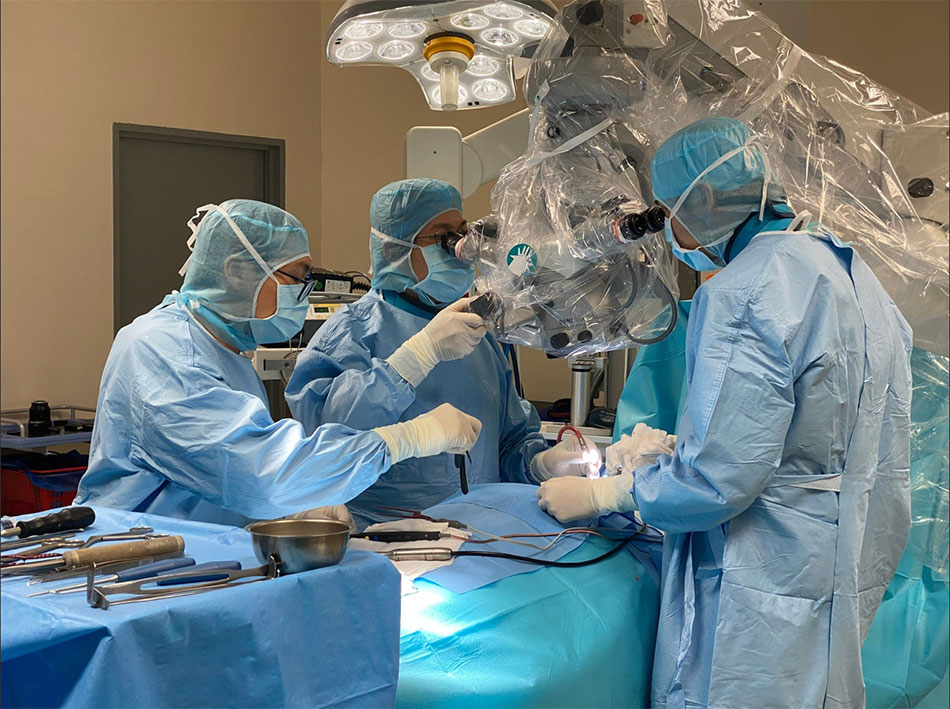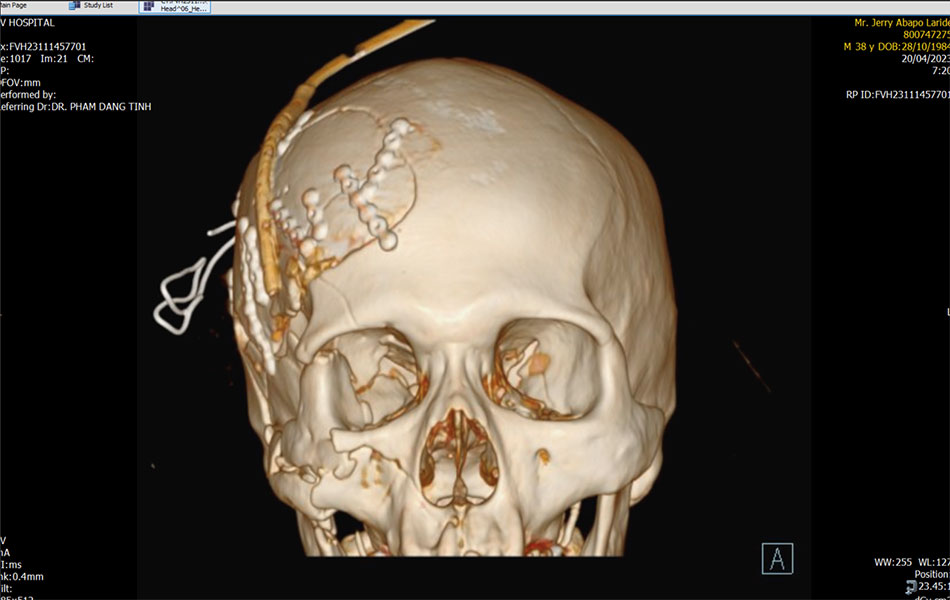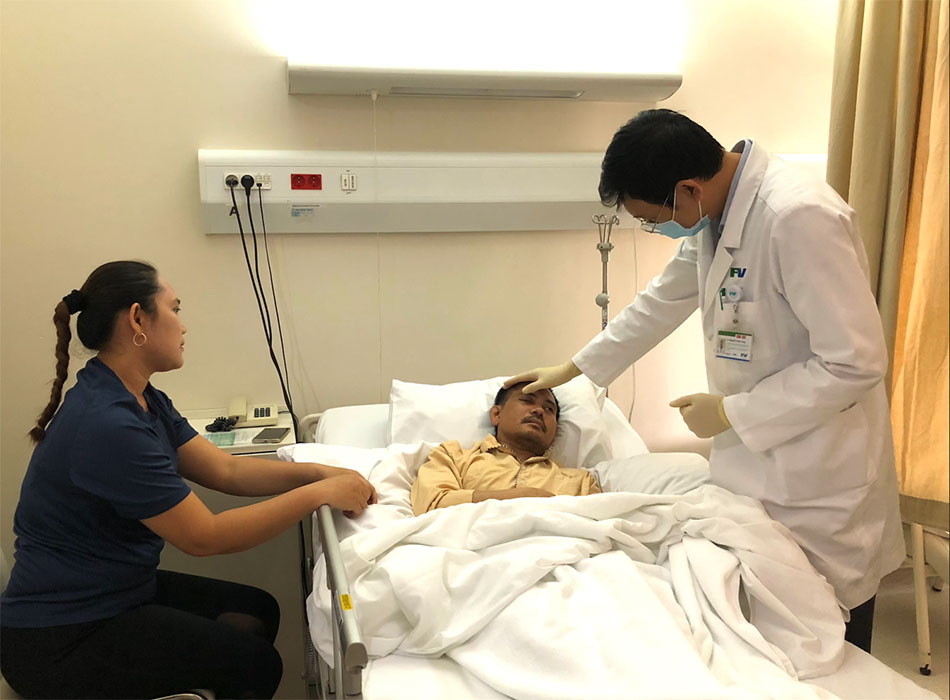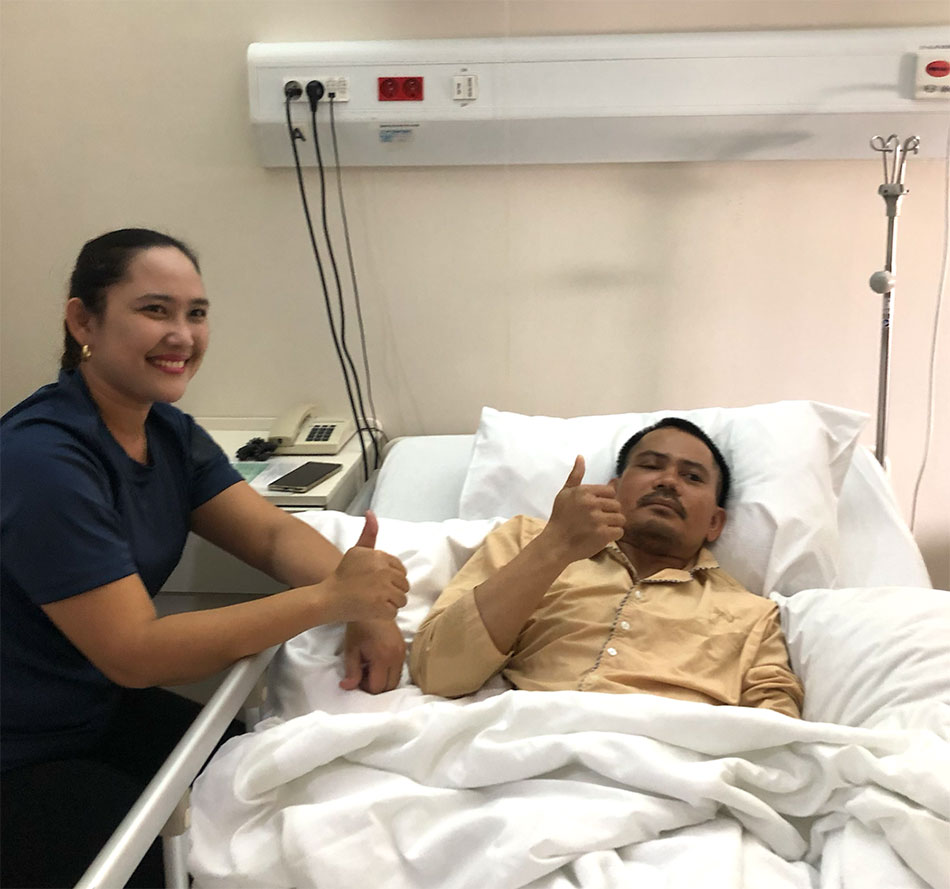While working on a cargo ship from China to Singapore, Mr Jerry Laride Abapo, a 38-year-old Filipino seafarer, unfortunately had an accident when a mooring rope struck his head, causing severe injuries to his skull and fracturing one side of his face.
Mr Abapo was in critical condition and required immediate neurosurgery to save his life. Other injuries would be addressed subsequently.

Emergency surgery for the Filipino seafarer
FV Hospital collaborates with 6 specialties to save the patient’s life and reconstruct his face.
Mr Abapo made significant progress and has just been discharged from FV Hospital after more than a month of treatment. He will return to FV for a follow-up appointment in six months.
The accident occurred in international waters close to Vietnam. Mr Abapo was brought to the rescue area in Phao So 0 (Null Island) in Ba Ria-Vung Tau and admitted to Vung Tau Hospital on April 17th. The doctors there assessed his complex injuries and determined that he needed to be transferred to a facility with higher-level treatment capabilities. After receiving initial emergency care, Mr Abapo was promptly transferred to FV Hospital the same day.
Racing against time to perform a challenging surgery.
When he arrived at FV, Mr Abapo was unconscious. FV Hospital’s Accident & Emergency Department promptly conducted diagnostic tests to assess the degree of the patient’s trauma and discovered that he had multiple head injuries, combined with intracranial bleeding, brain compression, bruised and protruding eyes, and a fractured jaw.
A multidisciplinary consultation quickly took place among the Accident & Emergency, Neurosurgery and Endovascular Neurosurgery, Oral & Maxillofacial Surgery-Dental Surgery, Ophthalmology & Refractive Surgery, and Anaesthesiology & ICU departments. Doctors concluded that the patient’s condition was extremely critical, and he needed an urgent brain surgery to save his life, while other injuries could be addressed later.
“The patient had suffered a severe brain injury with blood clotting beneath the hard membrane. If the surgery was delayed, brain herniation might occur, potentially causing death. If the patient survived, there was a risk of neurological deficits and paralysis,” said Dr Nguyen Manh Hung, head of FV’s Neurosurgery and Endovascular Neurosurgery Department. It was estimated that Mr Abapo 13 hours had passed since the accident occurred, therefore every precious second must be utilised to save the patient’s life.
FV’s Anaesthesiology & ICU swiftly developed a detailed plan for the emergency surgery. Dr Ly Quoc Thinh, Specialist Level II, head of the Anaesthesiology & ICU Department at FV Hospital, recognised that this was a challenging case for anaesthesiologists.
“The patient has multiple head injuries, making resuscitation and airway management extremely difficult. Furthermore, the bleeding causing brain compression could lead to sudden cardiac arrest and respiratory failure. As the patient had eaten prior to the accident, there was an additional risk that inserting the airway device may trigger gastroesophageal reflux, resulting in aspiration pneumonia.”
The process of anaesthesia and critical care proceeded smoothly. During the thee-hour surgery, Dr Hung and the team successfully removed the entire blood clot that was compressing Mr Abapo’s brain, performed haemostasis for the torn meningeal artery due to skull fracture, and controlled bleeding beneath the dura mater. Subsequently, surgeons realigned all fractured skull bones to restore the patient’s complete cranial structure.

The 3D Cone Beam CT scan revealed severe fractures in the facial bones of the patient.
The next day, Anaesthesiology & ICU Department’s doctors breathed a sigh of relief as Mr Abapo regained consciousness and no longer required ventilator support. At this point, specialists from the Oral & Maxillofacial Surgery-Dental Surgery and Ophthalmology & Refractive Surgery departments were invited to discuss the treatment plan for his fractured jaw and orbital area.
3D Cone Beam CT images obtained from the Planmeca Vico G7 machine provided a clear and detailed visualisation of the craniofacial bone structures, revealing the extent of the fractures. The Ophthalmology team assessed that despite severe orbital injuries resulting in eyelid ptosis and diplopia (double vision), the patient’s vision was otherwise normal. Dr Vo Le Khanh Hung, Specialist Level I, Ophthalmology & Refractive Surgery, stated that this issue could be restored over time.
Two weeks after the initial surgery, Mr Abapo underwent a reconstructive surgery to restore his orbital floor and realign the fractured bones. Nguyen Thanh Tung, MD, PhD, head of Oral & Maxillofacial Surgery-Dental Surgery at FV Hospital, explained: “In the second surgical procedure, we aimed to minimise intervention in the zygomatic bone area, using small incisions and minimising tissue damage to perform bone alignment.”
The surgery to stabilise Mr Abapo took six hours.

The patient’s facial region and overall health have shown significant positive recovery during his hospital stay.
Sau phẫu thuật vùng hàm mặt, bệnh nhân tiếp tục được theo dõi ở đơn vị săn sóc tích cực để các bác sĩ điều trị viêm phổi, suy hô hấp sau mổ, cân bằng các rối loạn tim mạch, rối loạn điện giải, tăng cường dinh dưỡng, phòng tránh loét do nằm lâu. Đồng thời, Khoa Vật Lý Trị Liệu Và Phục Hồi Chức Năng hướng dẫn bệnh nhân một số bài tập để vận động hàm và vận động mắt.
“The doctors at FV are truly amazing!”
After one month of treatment at FV Hospital, Mr Abapo has made remarkable progress and is ready for discharge. Ms Imperatmz Laride, his wife and a nurse, feels fortunate that her husband was treated at FV Hospital.
She said, “The doctors at FV are highly skilled and made extraordinary efforts to save my husband’s life. Patient care services at FV are also excellent! They played a crucial role in his speedy recovery. I am delighted that not only his motor functions but also his memory has recovered quickly.”
Trusting in the expertise of FV’s Vietnamese doctors, she mentioned that she will accompany her husband when he returns to FV for follow-up examination in six months’ time.

Filipino seafarer Mr Abapo and his wife express their happiness and gratitude to FV Hospital doctors for saving his life
When Dr Tung examined Mr Abapo before his discharge at the end of May, the Filipino seafarer was touched and grateful, repeatedly saying, “Thank you, doctor! The doctors at FV are truly amazing!”
According to the assessment of FV doctors, this severe accident had affected Mr Abapo’s facial nerve (nerve VII), and it would take about six months for Mr Abapo to fully recover all of his functions. Commenting on the success of the treatment for the Filipino seafarer, Dr Tung remarked, “Thanks to the timely and coordinated collaboration of six specialised departments, we achieved positive treatment outcomes for the patient. Additionally, the support of modern equipment and machinery helped FV doctors to accurately assess the patient’s condition, enabling us to make timely, effective treatment decisions.”

 Vi
Vi 












